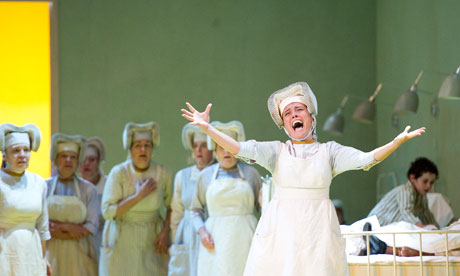
The Royal Opera ended last season with two Puccini revivals distinguished by superb conducting – Andris Nelsons's in Madama Butterfly and Antonio Pappano's in Tosca – and the new season opens with more of the same. Pappano is one of the common denominators through the new production of Il Trittico, the trilogy of one-acters that is mostly seen piecemeal these days, rather than as the sequence Puccini devised. The other constant is the director Richard Jones, who here has added new versions of Il Tabbaro and Suor Angelica to his existing production of Gianni Schicchi, which first appeared at Covent Garden in 2007 as half of a double bill with Ravel's L'Heure Espagnole.
John Macfarlane created the sets for that show, translating Schicchi from the renaissance to shabby postwar Italy. The new stagings have different designers, though they also relocate the two operas more or less to the 1950s. Ultz creates a grim, inner-city quayside for Il Tabarro, while Miriam Buether comes up with a cool, airy sanatorium for Suor Angelica. Both are reasonably effective, though within those frames the productions don't always follow the rule that less can mean much more. While the grand guignol of Tabarro is being played out, Jones continues to add distracting detail behind the protagonists – Lucio Gallo's unbending Michele, Aleksandrs Antonenko's hunky Luigi and Eva-Maria Westbroek's disappointingly coarse-grained Giorgetta, a less pneumatic version of her Anna Nicole in Turnage's opera earlier this year. Those add-ons blur the focus of the drama, just as in Suor Angelica, where the transforming of Ermonela Jaho's touching Angelica from the gardener of the original scenario to the pharmacist in a children's ward too obviously underlines the tragedy of the death of her own child and her subsequent suicide.
Schicchi comes as a joyous comic relief after those two samples of human misery. Gallo takes the title role; he's very different from either of his predecessors in this production – Bryn Terfel and Thomas Allen – with low cunning rather than charm as his main weapon. All the smaller roles are crisply taken, and both Francesco Demuro's Rinuccio and Ekaterina Siurina's Lauretta deliver their arias with panache, although the comedy doesn't run as smoothly as before. Pappano keeps it all on track though, just as he so deftly touches in all the atmospheric detail in Tabarro and refines every ravishing string texture in Suor Angelica. It is his evening above all.
• Broadcast on Radio 3 on Saturday.

